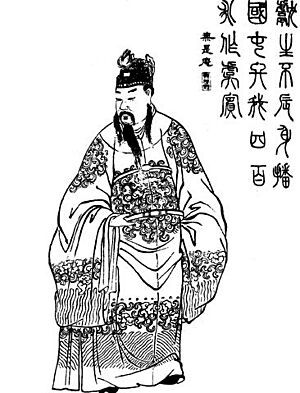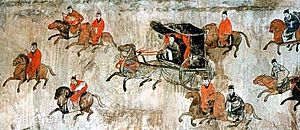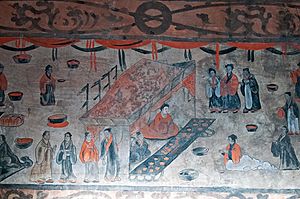Emperor Xian of Han facts for kids
Quick facts for kids Emperor Xian of Han |
|||||||||
|---|---|---|---|---|---|---|---|---|---|

A Qing dynasty illustration of Emperor Xian
|
|||||||||
| Emperor of the Han dynasty | |||||||||
| Reign | 28 September 189 – 11 December 220 | ||||||||
| Predecessor | Emperor Shao | ||||||||
| Regent | |||||||||
| Duke of Shanyang (山陽公) | |||||||||
| Tenure | 11 December 220 – 21 April 234 | ||||||||
| Successor | Liu Kang | ||||||||
| Prince of Bohai (渤海王) | |||||||||
| Tenure | 189 | ||||||||
| Prince of Chenliu (陳留王) | |||||||||
| Tenure | 189 | ||||||||
| Born | 2 April 181 Luoyang, Han China |
||||||||
| Died | 21 April 234 (aged 53) Henei Commandery, Cao Wei |
||||||||
| Consorts | Empress Fu Consort Dong Empress Xianmu Consort Cao (Xian) Consort Cao (Hua) Consort Song |
||||||||
| Issue | unnamed eldest son Liu Feng, Prince of Nanyang Liu Xi, Prince of Jiyin Liu Yi, Prince of Shanyang Liu Mao, Prince of Jibei Liu Dun, Prince of Donghai two other sons two other daughters Princess Changle |
||||||||
|
|||||||||
| Dynasty | Han dynasty | ||||||||
| Father | Emperor Ling | ||||||||
| Mother | Empress Linghuai | ||||||||
| Emperor Xian of Han | |||||||||
|---|---|---|---|---|---|---|---|---|---|
| Traditional Chinese | 漢獻帝 | ||||||||
| Simplified Chinese | 汉献帝 | ||||||||
|
|||||||||
Emperor Xian of Han (born Liu Xie) was the 14th and final emperor of the Eastern Han dynasty in China. He ruled from 189 to 220 AD. He was a son of Emperor Ling and the younger half-brother of his predecessor, Emperor Shao.
In 189, when he was eight years old, a powerful military leader named Dong Zhuo took control of the Han government. Dong Zhuo removed Emperor Shao from power and put Liu Xie on the throne instead. Emperor Xian, as he became known, was really a "puppet ruler" under Dong Zhuo's control.
In 190, other regional military leaders formed a group to fight Dong Zhuo. They wanted to free Emperor Xian. Dong Zhuo then destroyed the capital city, Luoyang, and forced the emperor and everyone else to move to Chang'an. After Dong Zhuo was killed in 192, Emperor Xian was controlled by two of Dong Zhuo's former helpers, Li Jue and Guo Si. Even though other regional leaders knew Emperor Xian was being held captive, they did not help him.
In 195, Emperor Xian escaped from Chang'an during a fight between Li Jue and Guo Si. He returned to the ruined city of Luoyang. A year later, a powerful military leader named Cao Cao came to Luoyang. He took Emperor Xian under his protection and moved the capital to Xu. Cao Cao pretended to be loyal to Emperor Xian, but he was actually the real power behind the government. He used Emperor Xian's name to make his own actions seem official. This helped him defeat other rival leaders and try to unite the Han Empire.
However, Cao Cao lost a big battle called the Battle of Red Cliffs in 208-209. This battle led to the rise of three separate kingdoms: Wei, Shu, and Wu. In 220, after Cao Cao died, his son Cao Pi forced Emperor Xian to give up his throne. Cao Pi then started a new state called Cao Wei, marking the end of the Han dynasty. Emperor Xian was given the title Duke of Shanyang and lived a comfortable life. He died in 234, about 14 years after the Han dynasty ended.
Contents
Emperor Xian's Early Life
Liu Xie was born in 181. His father was Emperor Ling. His mother was Consort Wang. Sadly, Consort Wang died soon after Liu Xie was born. Emperor Ling was very upset and wanted to punish the Empress, but his advisors stopped him.
Liu Xie was raised by Emperor Ling's mother, Empress Dowager Dong. He was called "Marquis Dong" because of an old belief. Emperor Ling had lost several sons before, so both Liu Xie and his older brother, Liu Bian, were given special titles. Liu Bian was the son of the Empress and was older. However, Emperor Ling thought Liu Bian was not serious enough. He considered making Liu Xie his heir, but he could not decide.
When Emperor Ling died in 189, a trusted official wanted to kill the Empress's brother, General-in-Chief He Jin. He then planned to put Liu Xie on the throne. But He Jin found out and quickly made Liu Bian the new emperor. Later that year, Emperor Shao gave Liu Xie the title "Prince of Bohai." This title was later changed to "Prince of Chenliu."
The End of the Han Dynasty
Dong Zhuo Takes Control
After Liu Bian became emperor, He Jin became the most powerful person in the court. He and his advisor, Yuan Shao, planned to get rid of the eunuchs (court officials). However, the Empress Dowager He did not agree. So, they secretly asked several military leaders to march towards the capital, Luoyang. They hoped this would force the Empress Dowager to agree. One of these leaders was Dong Zhuo. He saw this as a chance to take control of the government.
The eunuchs found out about He Jin's plan. They set a trap and killed him. Yuan Shao then led his forces into the palace and killed most of the eunuchs. The remaining eunuchs took the young Emperor Shao and Liu Xie hostage. But they were eventually forced to take their own lives. When Dong Zhuo arrived, he was very powerful. He was not impressed with the nervous Emperor Shao. Dong Zhuo forced the young emperor to give up his throne to Liu Xie. This was partly because Liu Xie was raised by Empress Dowager Dong, whom Dong Zhuo respected. Liu Xie then became Emperor Xian. Dong Zhuo then killed Empress Dowager He and the former Emperor Shao. He was now completely in charge of the government.
Moving the Capital West

In 190, many local officials and military leaders formed a group against Dong Zhuo. This group was led by Yuan Shao. They were still afraid of Dong Zhuo's army and did not attack Luoyang directly. Dong Zhuo was also worried about their combined strength. So, he decided to move the capital west to the old Han capital, Chang'an. This city was closer to his power base. On April 9, 190, he forced Emperor Xian to move to Chang'an. He then set fire to Luoyang, leaving it mostly in ruins.
Later, a few officials, led by Wang Yun and Lü Bu, killed Dong Zhuo in 192. For a short time, it seemed like the Han government might return to normal. However, Wang Yun failed to make peace with Dong Zhuo's former helpers. They rebelled and killed Wang Yun.
Emperor Xian Returns to Luoyang

Dong Zhuo's former helpers, Li Jue and Guo Si, took control of Emperor Xian and the imperial court. But they were not good leaders. Their poor rule caused the Han Empire to break apart into many smaller areas ruled by different military leaders. In 195, Li Jue and Guo Si had a big fight. Li Jue held Emperor Xian hostage, while Guo Si held the officials hostage.
Later that year, they agreed to let Emperor Xian return to Luoyang. But as soon as Emperor Xian left Chang'an, they changed their minds. They chased him with their armies. They could not capture him, but Emperor Xian's court became very poor. They could not even find basic supplies. When they returned to Luoyang, many officials starved to death. At this time, a strategist named Ju Shou suggested that Yuan Shao should welcome Emperor Xian to his base. This would give Yuan Shao control of the central government. But other strategists disagreed, saying he would have to listen to the emperor. Yuan Shao listened to them and never welcomed Emperor Xian.
Cao Cao's Strong Influence
What Yuan Shao would not do, Cao Cao did. Cao Cao was a less powerful military leader at the time. He was the governor of Yan Province, with his main base at Xu (modern-day Xuchang, Henan). He saw how useful it would be to have the emperor under his control. In 196, he marched to Luoyang. After making a deal with Emperor Xian's generals, he entered Luoyang. He technically shared power, but he was really in charge.
Unlike Dong Zhuo, Cao Cao knew how to keep other generals and nobles happy. He gave them little real power but made sure they were still respected. This meant there was little opposition against him in the court. He then moved the capital to Xu to show his control over the government. When a general named Yang Feng opposed him, Cao Cao defeated Yang and moved the capital.
Cao Cao then started issuing official orders in Emperor Xian's name. This included a strong order criticizing Yuan Shao for taking over nearby provinces. Cao Cao and Emperor Xian seemed to have a friendly relationship on the surface. However, there were two major conflicts involving Cao Cao and other court officials.

In 199, Cao Cao was preparing for a big fight against Yuan Shao. A general named Dong Cheng claimed he had a secret order from Emperor Xian. Dong Cheng then planned with Liu Bei and others to kill Cao Cao. Liu Bei started a rebellion, waiting for Dong Cheng to act in the capital. But in 200, Dong Cheng's plan was discovered. He and his allies were killed. Liu Bei was later defeated by Cao Cao and had to flee. Dong Cheng's daughter was an imperial consort and was pregnant. Emperor Xian tried to save her, but Cao Cao had her executed anyway.
Emperor Xian's empress, Empress Fu Shou, was angry and scared after Consort Dong's death. She wrote a letter to her father, Fu Wan. In the letter, she accused Cao Cao of being cruel and hinted that her father should start a new plan against Cao Cao. Fu Wan was afraid of Cao Cao and never acted on the letter. In 214, her letter was found. Cao Cao was furious and forced Emperor Xian to remove Empress Fu from her position. Emperor Xian was hesitant, so Cao Cao sent his soldiers into the palace to pressure him. Empress Fu tried to hide but was found and dragged out. As she was taken away, she cried to Emperor Xian to save her. He could only respond that he did not even know what would happen to him. She was killed, along with her two sons and family, on January 8, 215. On March 6, 215, Cao Cao forced Emperor Xian to make his own daughter, Cao Jie, the new empress.
Abdication and Death
Cao Cao died on March 15, 220. His son and successor, Cao Pi, soon forced Emperor Xian to give up his throne to him. This event ended the Han dynasty. Cao Pi then started a new state called Cao Wei. He gave Emperor Xian the noble title Duke of Shanyang and gave him land. The former Emperor Xian died in April 234. He was buried with honors fit for an emperor, following Han traditions. The then-emperor of Wei, Cao Rui, was among those who mourned him. Since Emperor Xian's crown prince had already died, his grandson Liu Kang inherited his title. This dukedom lasted for 73 more years and had two more dukes. This practice of a new emperor giving a noble title to the previous emperor, from whom he took the throne, was a tradition in China.
Era Names
- 189: Yonghan
- 190–193: Chuping
- 194–195: Xingping
- 196–220: Jian'an
- 220: Yankang
Family
Emperor Xian had several consorts and children:
- Empress Fu (died 215)
- Liu Feng, Prince of Nanyang (died 200)
- Two other sons (died 215)
- Empress Xianmu Cao Jie (197–260)
- Princess Changle
- Consort Dong (died 200)
- An unborn child (died 200)
- Consort Cao (personal name Xian)
- Consort Cao (personal name Hua)
- Consort Song (personal name Dou)
- Other children from unknown mothers:
- An unnamed eldest son
- Liu Xi, Prince of Jiyin
- Liu Yi, Prince of Shanyang
- Liu Mao, Prince of Jibei
- Liu Dun, Prince of Donghai
- Two other daughters, both married Cao Pi
See also
 In Spanish: Emperador Xian de Han para niños
In Spanish: Emperador Xian de Han para niños
- Chinese emperors family tree (early)#Han dynasty, Xin dynasty and Shu Han
- Lists of people of the Three Kingdoms
 | Dorothy Vaughan |
 | Charles Henry Turner |
 | Hildrus Poindexter |
 | Henry Cecil McBay |

